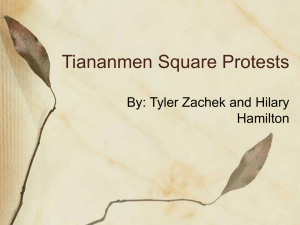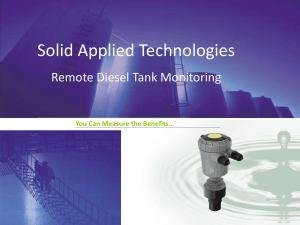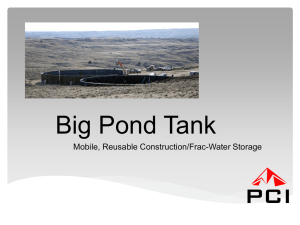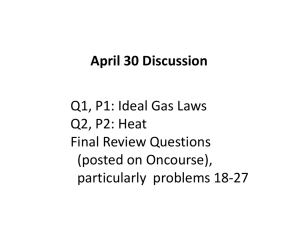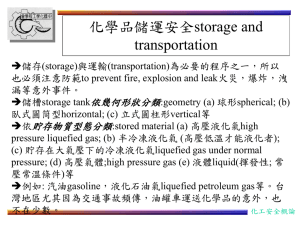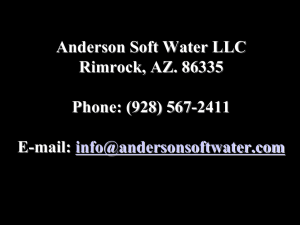TANK CALIBRATION PRESENTATION
advertisement
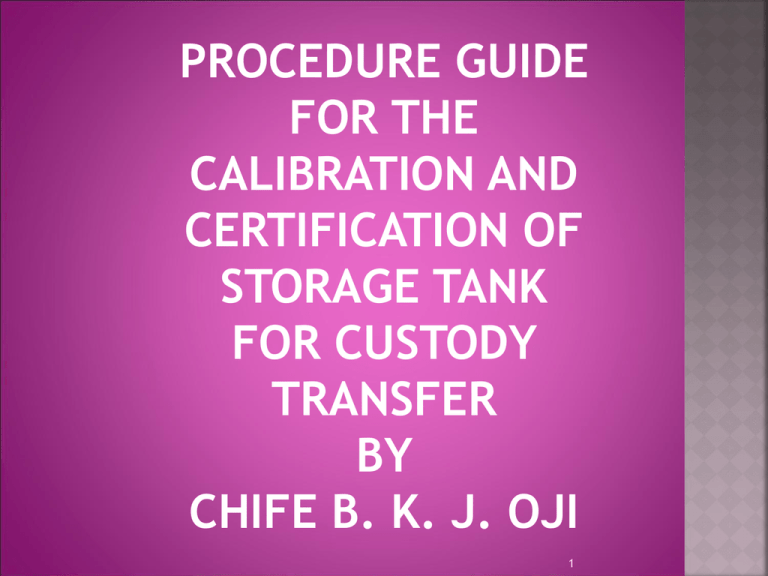
PROCEDURE GUIDE FOR THE CALIBRATION AND CERTIFICATION OF STORAGE TANK FOR CUSTODY TRANSFER BY CHIFE B. K. J. OJI 1 This procedure is used for all equipment and instrument used at custody transfer points. The equipment and instruments are: Thermometers Hydrometers Steel Tapes Storage Tanks (upright cylindrical types) Storage Tanks (horizontal cylindrical types) Barges Trailer Mounted Tanks (Tank Cars) 2 These equipments are to be calibrated by an approved or accredited corporate body. This corporate body shall be prequalified by the Director of Petroleum Resources (Government Agency). This validity period for each equipment shall be stated. Calibration shall be local except when the facilities are not available and approval must be given by D.P.R. Corporate Bodies and Agencies accredition for each equipment type must be set out and stand the reference. 3 This shall vary from job to job and nominated corporate body must formally apply for permission from the Department of Petroleum Resources (Government Agency). Approval shall be guided by previous job A D.P.R. Staff must be present for the following exercise: Strapping exercise Calibration chart compilation The following shall be added to the chart Full name and address of the Company. The tank number Name of Operator Location of tank number Other parameters indicated in the format at paragraph (2) below. Finally a column must be provided for the approval of the Director of D.P.R. 4 That is the process involved in measurement such as: For a vertical storage tank: Circumferences at specific locations Depth Plate Thickness Weights Volume of internal and external fixtures Bottom plate alignment with the purpose of drawing up a calibration chart for the tank to show quantity of oil at any given depth. 5 New Tank Five years operational life (Tank bottom must be clean and checked) Maintenance involving replacement of plate sections or alteraction of the “Deadwood” Any modification affecting tank volume to 0.015% 6 This shall be the API Standard 2550 or ASTMD1220-85 under the title “Method for Measurement and Calibration of Upright Cylindrical Tanks” As stated in the reference standards i.e. The essential equipment shall be the same with those for taking measurement of tank, shall be above ground and shall always be maintained in good condition. Both the tape for height measurement and that for circumference measurement should themselves have been calibrated in accordance with DPR guide or 7 Current certificate of recent calibration at 680F in accordance with the National Bureau of Standard Test Fee Schedule 202.404. Accessory equipment shall be provided. Equipment for determining temperature and gravity: Sample Can: For withdrawing samples in the process of tank temperature measurement, shall be the thief type as specified in ASTM-D4057. Thermometer: Shall be the total immersion type of range -5 to 215 deg F and shall conform with specification E1 described in ASTM book of Standard Part 18. Hydrometer: For gravity measurement shall be the thermohydrometer type calibrated in deg API and with range 0 to 100 deg API conforming to the specification E100 for ASTM Book of Standards. 8 Calibration Procedure: Tank clean and degassed. Tank be filled completely with water prior to the time of strapping. Tanks with the capacity above 500 bbl could be strapped at any condition of fill. (No discharge no fill) For critical measurement the following must be noted. Expansion and contraction of the tank shell under liquid head and temperature. Effect of tilt on the tank shell. Alignment of the tank bottom. 9 Float Roof Factor: Floating roof tank shall be provided with a table or formula for computing roof effect. The weight of the roof and all its appurtenances shall be separately determined and reflected in the tank table. Critical zones must be calibrated with liquid in accordance with API 2555 for ASTM-D1406. A separate calibration chart for the critical zone shall be prepared for each tank. 10 Field Data: All data collected during strapping as illustrated in the form. CALIBRATION OF HORIZONTAL STORAGE TANKS (a) Nominated company shall be accredited by DPR. The procedure for accreditation as enumerated above (apparatus). (b) Principle: For horizontal Tanks completion of its incremental volume from geometric dimensions of the cylindrical main body of the tank and those of the two heads are obtained. Other factor: (1) Deadwood (2) Elasticity of the Shell (3) Inclination of the tank 11 (c) Frequency of calibration of Horizontal Tanks. (1) (2) (3) (4) (5) All new tanks of this type to be used for custody transfer shell be calibrated before it could be approved for service and mandatorily after every five years of their operational life. A tank shall also be automatically due for recalibration, if the circumferential reading show a difference of 0.015% and above at a reference point, over reading of the last calibration of the tank. Whenever the deadwood is changed in configuration or arrangement. On relocating the tank to another position. After any major repair or maintenance of the tank. 12 Applicable Standard: This shall be the API Standard 2551 or ASTM-D-1410 captioned “Standard Method for Measurement and Calibration of Horizontal Tanks.” (e) Calibration Equipment: This shall comply in all respects with the specifications stipulated in the standard. (f) Calibration Procedure: The tank shall be clean, degassed and completely filled with water. The procedure outlined in the reference standard is followed to obtain the necessary parameters. A calibration chart for the tanks critical parameters to be obtained are: (d) (1) (2) (3) (4) (5) (6) Shell plate thickness Circumferential parameter Geometric dimension Elasticity Deadwood dimension Inclination of the tank 13 Field Data (1) A diagrammatic representation (2) Other data are liquid type and its level in the tank during strapping, cylinder shell thickness, the head and the horizontal inclination of the tank Tank calibration shall include: (1) Calculation of the volume of the main cylinder. (2) The spread diameter and the partial. The appropriate K factor of the circular segments of the heads. Shall be obtained from the standard tables of the reference standard to produce the required calibration chart for the tank to be presented in the format below 14 15
